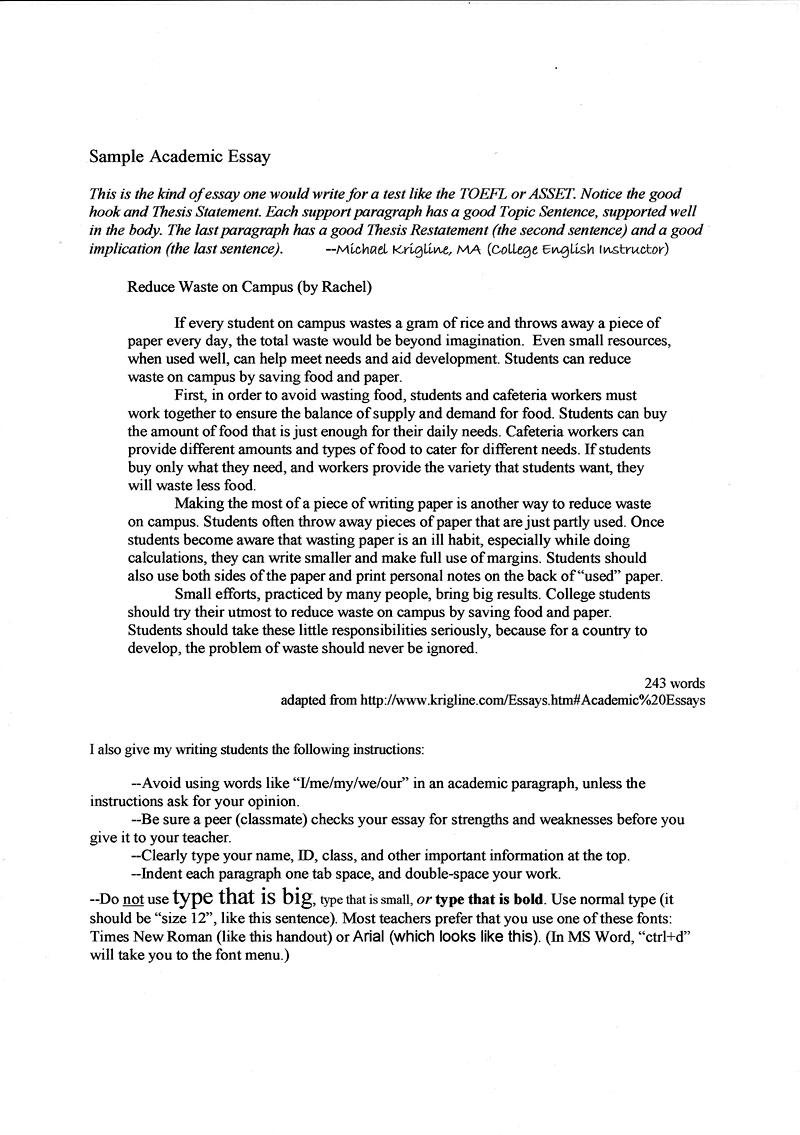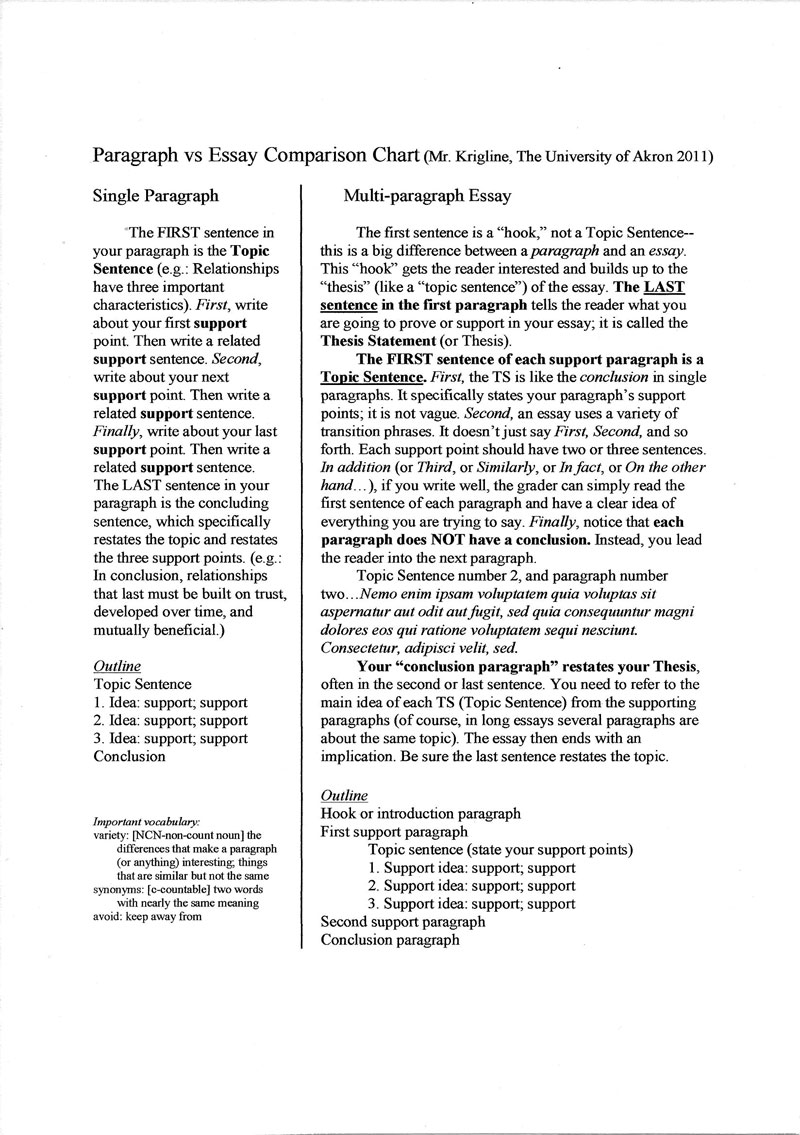Advice to English-learners,
regarding essays for standardized tests
Compiled for the students of Michael Krigline, MA
(2011); www.krigline.com
(I created this page for English-learners at the University
of Akron in 2011, who were preparing to take the TOEFL and the university's
own standardized placement test--called ASSET. I believe the advice is also
sound for those preparing for the IELTS, TEM-4, and other standardized
tests.)
Click here to see
sample TEM-4 essays Here is some older
advice: Writing Essays
Foreign Teachers:
click here for more advice
I've also pasted two related handouts at the bottom of this
page (A4 size paper).
General notes about writing an essay on a standardized test
(4/22/11 lecture)
Remember, you are not
trying to “fool” the graders into thinking that you have a high English
level. You are trying to give graders a true idea of your real English
level, so they can put you in a class at your level. If you are not ready
for “advanced level” or “university level” then you will find classes in
those levels very, very difficult (this often leads students to quit; but
classes at the right level would have helped them improve).
However, there are
some simple things you can do to give the best impression possible:
1. Content is
more important than “English skills.” Graders know that English-learners
will make spelling and grammar mistakes on timed tests. So don’t get too
upset when you know you’ve spelled something wrong, or are not sure about
the grammar in a sentence. As one “grader sheet” put it: “What’s important
is that [the students] have a clear, main idea that gets expressed and
supported well.” This does not mean that spelling and grammar are
unimportant (these affect the grade too). But organization and support
will get you a better grade than “perfect English” that does not really
answer the question.
2. Write
clearly. Graders are not supposed to pay attention to your hand-writing,
but it does influence them. If they can’t read what you wrote, or if it
looks messy, you may get a lower grade.
3. Leave space
for your corrections. First, graders like to see some corrections because
“editing” is an important, high-level skill. Second, the page will look
neater if you have a margin (white space) of about one inch on all sides.
If the paper has lines to write on, you can write single-spaced or
double-spaced (double-spaced will give you plenty of room to correct or
add something to your essay, but be sure you don’t run out of room at the
end; on the ASSET you have four lined pages to write on).
4. When the
writing prompt asks for your opinion, give an opinion! Some students say,
“I don’t really care about this topic, so I just wrote about both sides.”
This hurts your grade. Instead, pretend that you care, choose a side, and
support it. It is OK to write a paragraph about each side of the issue,
but be sure you keep your strongest arguments for the paragraph that tells
your opinion.
5. Don’t be
afraid to use “I.” Some writing teachers (including me) don’t want
students to include “I” in their essays. But if the writing prompt asks
for your opinion, or presents “two sides” for you to choose from, then it
is OK to write about yourself and your opinion. In fact, on the TOEFL and
ASSET, this is what the graders expect! Just remember that “writing for a
test” and “writing in the real world” are sometimes very different skills!
Why do
some teachers tell you to leave “I” out? In most college courses, you
write about facts, not personal opinions or experiences. Here is a quote
that supports this idea: “Ask your professor about using the first person
before you submit the essay. Some professors allow you to say things like
“I am going to prove…,” but others hold to the idea that the subjective
I should never appear in academic writing.”) p 178, Yale Daily News
Guide to Writing College Papers,” by Marti Page and Justin M. Cohen, publ:
Simon & Schuster 2000)
6. Write about
the topic in the writing prompt. This sounds simple, but students often
stray into other topics, or forget to write about some part of the test
question. For example, pretend this is your writing prompt.
What
are the important qualities of a good son or daughter? Have these
qualities changed or remained the same over time in your culture? Use
specific reasons and examples to support your answer.
Some
students write about “the important qualities of a son or daughter” but
forget to answer the second part: “have these qualities changed…” If you
forget to answer part of the question, it will hurt your grade. If you are
not really sure what the writing prompt means, make a guess based on the
words that you do understand, and use those words in your answer.
7. “Better” is
better than “longer.” Most graders read your essay quickly, not
carefully. Remember, they are probably reading dozens, or even
hundreds, of essays like yours. Most graders will give you a better score
if your work shows organization and thought instead of just length. A long
essay does not impress anyone if it just says the same things over and
over.
8. Think
before you write. The most important thing you can do is spend three to
five minutes thinking before you start writing. Draw a
brainstorming map, and group ideas together so you can create two or three
support paragraphs, each of which has two or three supporting ideas. Good
support impresses graders more than long paragraphs.
9. Carefully
craft your thesis statement and each paragraph’s topic sentence. Graders
often read these parts (and the conclusion) first. If the grader is in a
hurry, or bored, or tired, then he/she may not even read the body of your
essay. I have heard that the average grader spend three to five minutes
with each essay. This is why a GOOD thesis statement, supported in the
body with two or three GOOD topic sentences, is SO IMPORTANT!
10. Your first
paragraph is the most important. Graders are most impressed if your
introduction carefully answers the writing prompt with three to five
relevant, clear, grammatically-correct sentences. Start with a “hook” (a
related story, example or fact) and end with a great thesis statement that
previews the ideas you will develop in the body. Of course, you need to
support those ideas with related topic sentences/body paragraphs, but do
not underestimate the power of the “first impression” you give to the
grader.
11. End well. I
heard a grader say, “You can tell when the student ran out of time.” Don’t
let this happen to you. Save time to write a good conclusion, summarizing
your main ideas. Remember, people are most affected by what they read
last, and thus your conclusion will have a big impact on your grader just
before he/she gives your essay a score.
12. Write 4 or
5 paragraphs. If you have about an hour for a timed writing test, graders
expect you to write about 4 or 5 paragraphs, using about 300 words. I have
seen many weak essays where the students write a long introduction, trying
to say as much as they can about the topic, and then a long body paragraph
giving quotes and facts, and then they run out of time and write a quick
conclusion. This tells me that they didn’t think before they
wrote. Instead, write a 3-5 sentence introduction (see above), write
three body paragraphs (giving three strong arguments to support your
thesis), and save time to carefully write your conclusion (even if you
have to “leave space” for your last body paragraph, and come back to it
later--although you MUST NOT start your conclusion on a new page, because
the grader might not see it!).
13. Do not make
up quotes. If you really memorized something, you can use it. But it is
better to write [I read in a magazine that thousands of people die every
month because of pollution.] than to make up a quote like this [According
to Time magazine: “Thousands of people die every month because of
pollution.”] or [Prof. George Kline said, “Thousands of people die every
month because of pollution.”]. Because English-learners will probably put
a small grammar mistake in these “quotes,” many American graders will give
you a lower score because they think you are “making up” the quote.
14. DO
paraphrase things your read. Instead of using direct quotes, just write [I
read in a magazine that pollution kills thousands of people every month.]
or [One of my teachers said that pollution kills thousands of people every
month.]. This shows that you know how to support your ideas with “outside”
facts, but lets you avoid the problem of “made up quotes.” Graders will
not lower your score if you make a grammar mistake when you paraphrase.
(By the way, you can learn more about how to paraphrase in my book,
Successful Writing for the Real World.)
15. You can use
or quote “general knowledge” if you really know how to say something in
English. (This means that you can quote Confucius if your grader will be
Chinese, quote from the Quran in the Middle East, quote from the Bible or
Shakespeare in America, etc.) But even with “general knowledge” it is
often better to use a paraphrase than to use a quote (unless you really
memorized a sentence in English).
16. Some
“little things” are more important than others. Remember that graders are
human, and therefore they have opinions about things too. Do not “insult”
those who have a different opinion than yours (maybe your grader holds the
other opinion!). Instead, support your idea clearly and with respect. Also
remember that many graders have strong opinions about sexism, religion,
politics, etc. You don’t want to offend them. I’ve even heard female
graders say they give “higher marks” to students who use “he/she” instead
of “he” to mean “any person”--they say it shows “higher skill” when maybe
it just shows an awareness of sexism (a hot topic for many people).
[If you
don’t know what I mean by “he/she,” here are some examples. When I was a
child, this sentence was fine: “A doctor when to the bank, but he couldn’t
get any money because he left his credit card at home.” But today, this
sentence is better: “A doctor went to the bank, but he/she couldn’t get
any money because he/she left his/her credit card at home.”]
17. Don’t
expect to have your phone handy. Some students think they can keep a phone
next to them “so they can tell the time.” But in most test rooms, phones
are not allowed (because people use them to cheat). So, wear a watch. If
you are allowed to use a dictionary (which is NOT common), then it has to
be a dictionary, and NOT a phone. These are the rules; don’t let them
surprise you!



This resource was created for our students under my
understanding of "fair use" for educational resources.
© 2011 Michael Krigline, all
rights reserved. As far as I am concerned, people are allowed to print/copy
it for personal or classroom use.
(see Website Standards and Use Policy)

